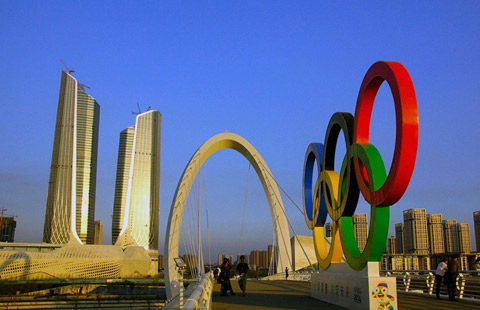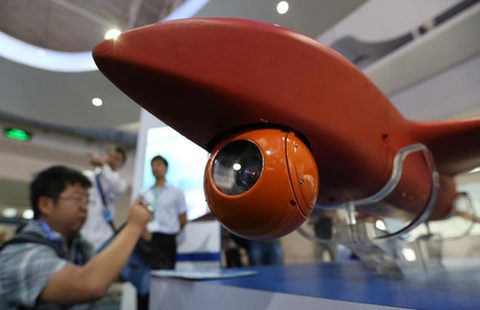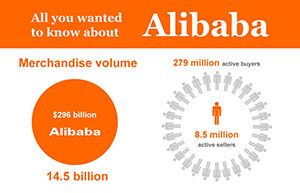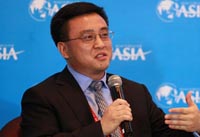Insider explain what hinders China's film industry
By LYU CHANG/ZHOU LIMING (China Daily) Updated: 2014-09-19 09:16
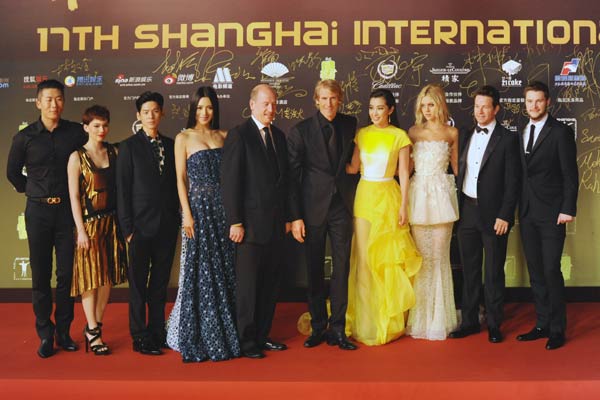 |
|
Transformers: Age of Extinction director Michael Bay (fifth from right) and its cast, including Chinese actress Li Bingbing (fourth from right), attend the 17th Shanghai International Film Festival in June. China's film market has been growing rapidly over the past decade and is looking to move toward a burgeoning movie industry. CHINA DAILY |
Hollywood style of functioning can boost returns for Chinese companies
Though China has become a key market for film companies, it has a long way to go before it can create a Hollywood-like ecosystem for the global entertainment industry, said Jack Gao. He added that the booming domestic market provides enough cushion for companies to move up the ladder, especially if they can surmount challenges like talent shortages and financing.
Gao has worn many hats during his long and storied career. He has handled all of his roles with equal aplomb-be it as the president of Microsoft China, as the senior vice-president of Rupert Murdoch's News Corp or in his recent role as chairman and chief executive officer of Bison Entertainment Media Group, a company with businesses including entertainment, retail, health care and tourism.
"The biggest problem for the entertainment industry in China is the absence of good talent agencies. These agencies are essential as they help bring actors, directors and writers under one umbrella, which in turn makes it easier for production houses to source talent. Though this role in China is filled by a few producers, directors or independent studios, they are often weighed down by resource constraints," he said.
 |
 |
"The $4 trillion industries-IT, Internet, telecom and media-are in convergence," he said. "The entertainment industry is being continuously impacted by digital technologies and quickly changing in terms of the business model and also in the way how premium content is produced and distributed.
"China must industrialize and revolutionize its film business to meet the growing demand for premium entertainment content," he said.
During the past 10 years, China's film market has had an annual growth rate of 34.57 percent and moved up from 1 billion yuan ($160 million) in 2003 to 21.7 billion yuan in 2013. With high growth rates expected to continue in the long term, industry sources have expressed confidence that China will soon overtake the United States as the top entertainment market in the world.
The absence of a healthy ecosystem that can cultivate and protect creative ideas, actors and directors has led to a severe shortage of a thriving community of screenwriters and professionals.
Scarcity of good screenplays has long been a headache and will continue to be a major hurdle for China's film industry, Gao said. "People have great ideas in China, creative ones, but they just don't know how to develop them."
To tackle this issue, Bison Capital has acquired a stake in Resolution, a US-based talent and literary agency headed by Jeff Berg, the former chairman and chief executive of International Creative Management.
"The talent agency economics is the real core of the Hollywood movies, which are often made on an industrial line," he said. "China needs such a system to ensure that its movies match up to the global commercial and technical quality levels."
Though the terms of Resolution's arrangement with Bison have not been disclosed, it is believed that the talent agency, which has 30 agents, already does business in China and represents several Chinese actors. David Unger, the Resolution agent who represents Michelle Yeoh, the Hong Kong-based action star known for her role in Crouching Tiger, Hidden Dragon, one of the most successful Chinese-American co-productions of all time, will coordinate Resolution's business in China.
- Shanghai launches its gold exchange
- Public freely discusses FTZ with Li
- Wal-Mart's fresh take on keeping food safe
- Causes behind fall in social financing
- Retail ties help Sinopec move to mixed ownership
- Easing fails to lift home sales in Aug
- Top 10 food and beverage companies in China
- Indebted Chinese firms face off with ratings agencies

